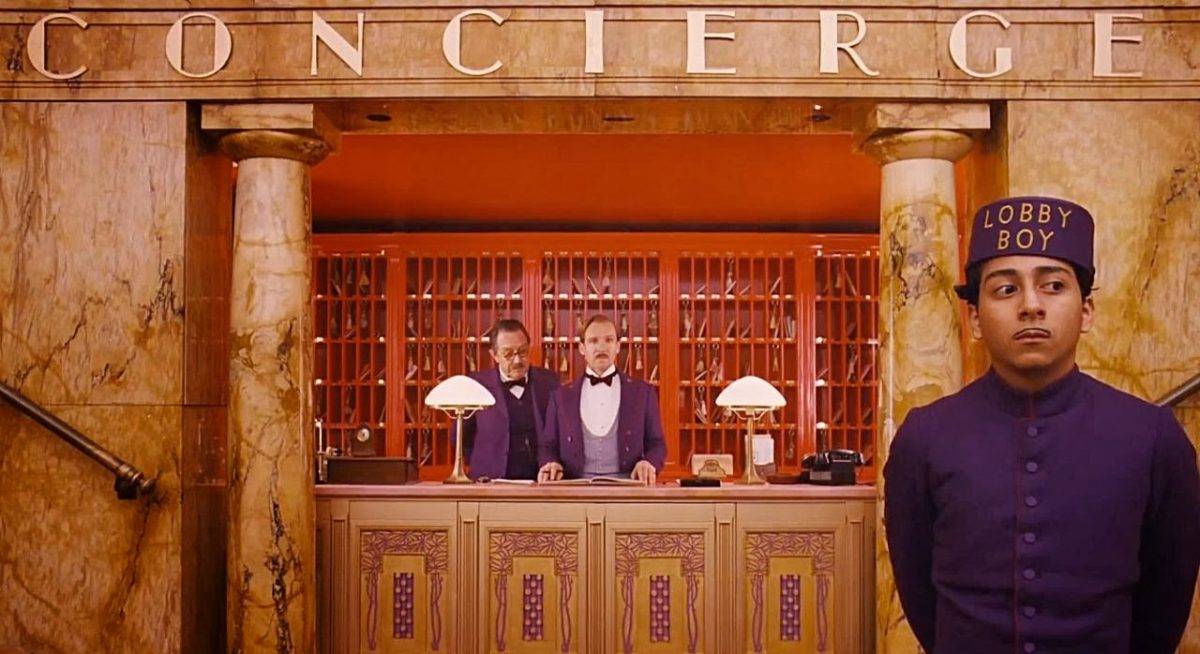 (5 / 5)
(5 / 5)
Whether you love him, hate him, or are simply indifferent, you have to admit that Wes Anderson is a unique director.
More so than any other filmmaker at work today, he has a personal style to which he is beholden. Call it meticulous, call it prissy, The Grand Budapest Hotel fits perfectly into his catalogue of almost confectionery delights.
Grand Budapest is the story of the hotel and the people who occupy it, both in its rundown Eastern Bloc state and its glory days circa 1932. Recollections of the latter period come from Zero Moustafa (Oscar winner F. Murray Abraham) – once a bellboy at the Grand Budapest, now the hotel’s reclusive owner – but they are recounted as part of a memoir by The Author (played by Jude Law as a young man and Tom Wilkinson in his later years).
All of this is book-ended, meanwhile, by a young girl reading the eponymous novel beside a monument erected to his legacy, presumably sometime after his death.
If this sounds like an elaborate way to go about telling a simple story, it is, of course, but that’s part of Anderson’s charm: the ornamentation and style of Grand Budapest relates directly to its substance, what it’s “about”. Amidst all its clockwork machinations, at the heart of the film lies a tale of being extraordinary, if only for its own sake.
This ethos finds its embodiment in the form of Ralph Fiennes’ hyper-effective concierge, M. Gustave H. A liberally perfumed, exquisitely mannered lothario, Gustave takes the young Zero (Tony Revolori) under his wing following the mysterious death of one of his elderly patrons/lovers (a heavily made-up Tilda Swinton).
What follows is a series of pursuits, chases, standoffs, pointless shootouts, and jailbreaks, down ski slopes, over balconies, and a funicular railways, set against exquisitely painted backdrops and featuring a parade of familiar faces (a humorously slap-headed Harvey Keitel, a winsome Saoirse Ronan, an as-always delightful Bill Murray, Willem Dafoe as a vampiric hitman). And, as always, Anderson frames it all beautifully, too.
Your appreciation for Grand Budapest will depend largely on your appreciation of its eccentricities, its charm, and its capacity to switch from leisurely to breakneck in the blink of an eye. The film often feels like a period fairytale for adults – Grand Budapest it not exactly child-friendly; for one, check out the painting with which Zero chooses to replace Boy with Apple – but it manages to be both highly funny and deeply sad.
There’s a nostalgic feel to Grand Budapest, one that harkens back to not just another era of film-making – say, Powell & Pressburger – but to an age when opulence meant something, a sanctuary or refuge. As fascist goons batter against the peace of the fictional Republic of Zubrowka, so Gustave M. comes to stand for the forces of free-will, self-interest – personality!
The film may be a romp, but it’s one pervaded by a sense of loss. If Grand Budapest is an artisan chocolate, like those from Mendl’s, suffice to say it is a bittersweet one, even if it’s more about the flavor than leaving with your belly full. There’s oodles of inventiveness – charm, panache, and brio – on display here, and if you can handle the more whimsical aspects – the twee, the schtick, and the deadpan – you’ll find your visit to The Grand Budapest Hotel an utter pleasure.
